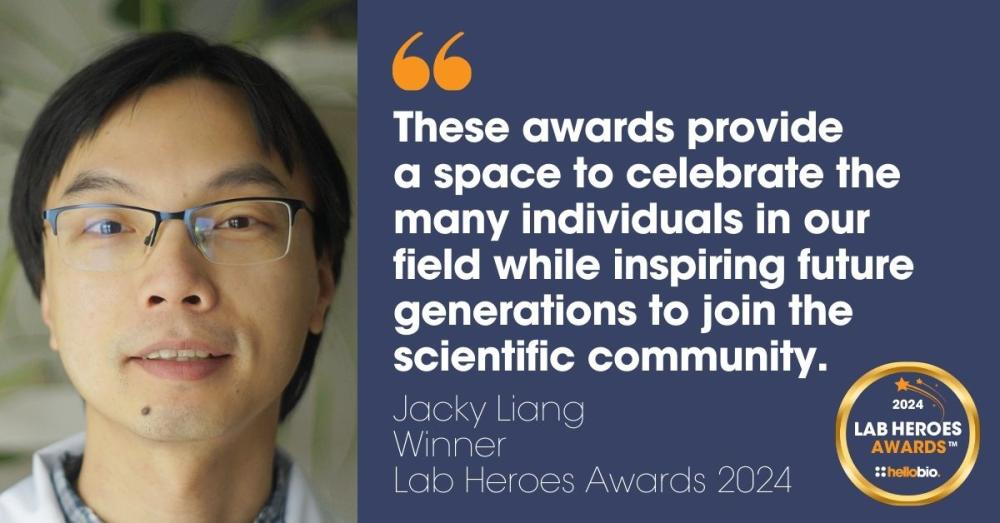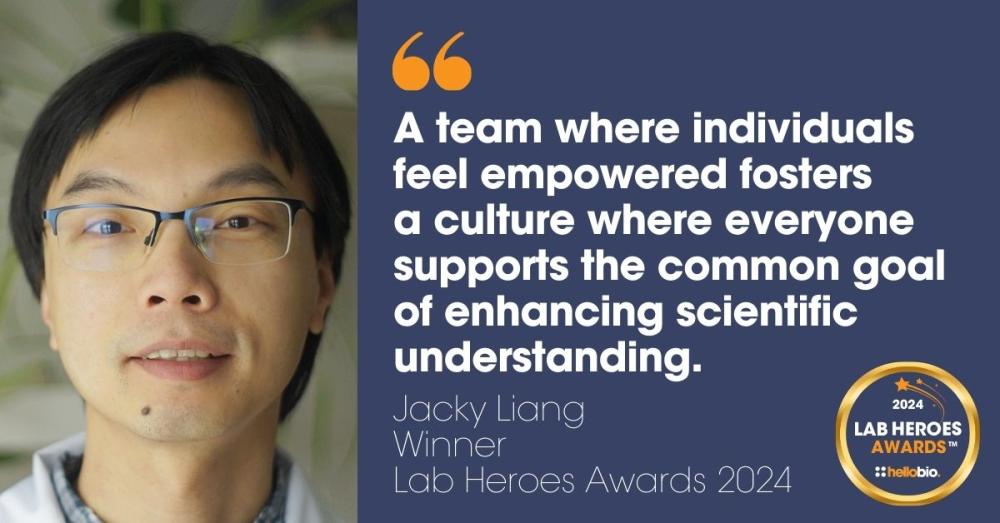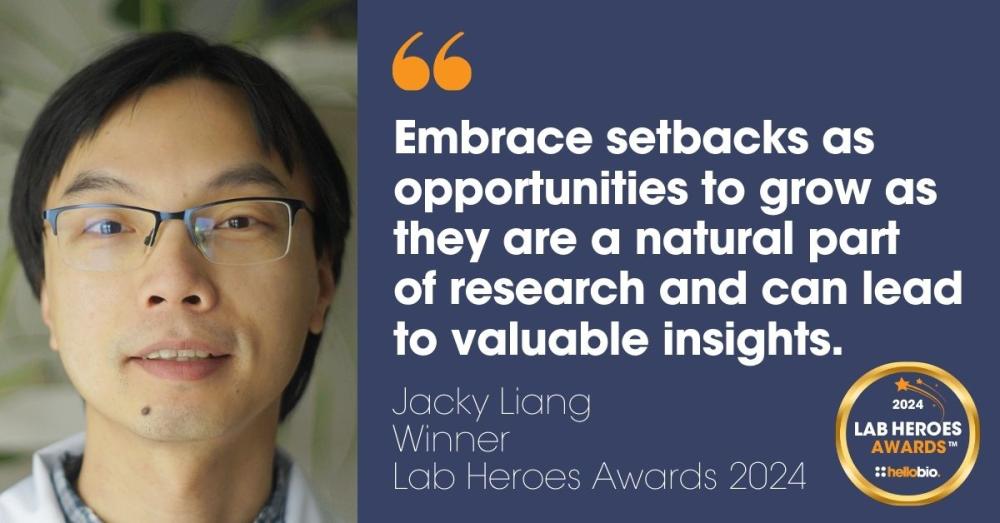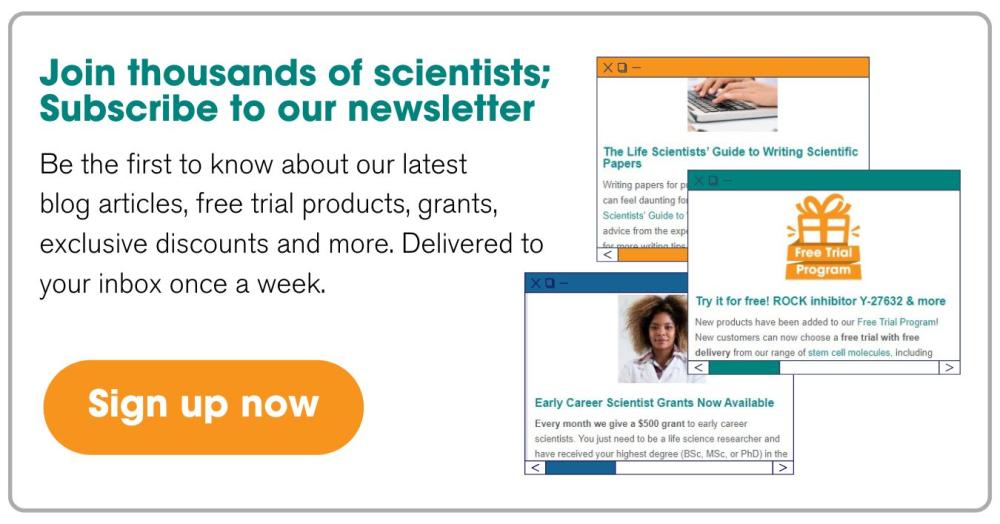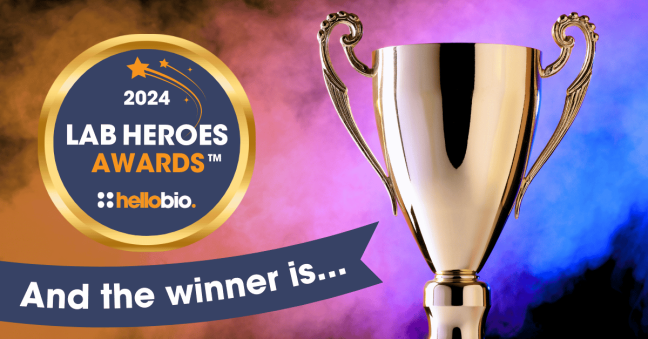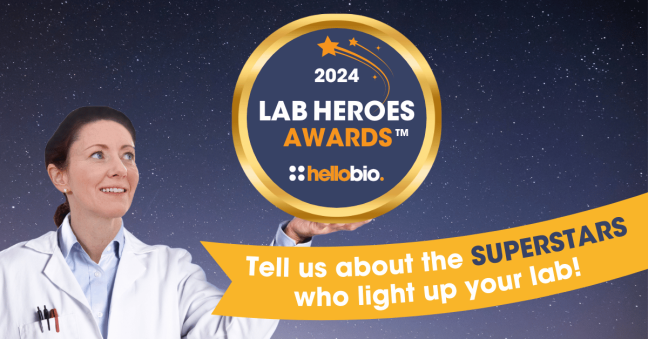Meet Our Lab Heroes Awards™ 2024 Winner: Jacky Liang
Each year our Lab Heroes Awards™ competition gives scientists around the world the chance to tell us about the colleagues who’ve made the biggest impact in their lab. This year, choosing just one winner from a huge range of outstanding scientists was exceptionally tough. However, our judging panel selected a nominee whose influence on his colleagues was clear, not only from the number of nominations received, but from the dedication and gratitude expressed in the stories they shared about him.
Jacky Liang of the University of Ottawa was chosen as our Lab Hero for 2024 after receiving more than 20 incredible nominations from his colleagues at the School of Psychology. Professor Hélène Plamondon described him as ‘a spectacular mentor’ who has helped ‘hundreds of graduate and postgraduate students’ to progress in their science careers.
Colleague Katie Sinclair, said: “Stepping into a research lab can sometimes feel daunting or intimidating. Jacky has ensured that I feel supported, safe, and encouraged throughout my journey with the Neuroscience Memory Lab. He is unbelievably intelligent and generous, and is always ready to lend a hand to any student that may require support. He shows precision, tenacity, and expertise in what he does, while consistently demonstrating kindness when facing challenges. This greatly inspires me as an undergrad. Jacky is incredibly humble, but I’m confident my colleagues would firmly agree that he is the driving force behind the exceptional quality of work produced in our labs!”
Jacky completed his bachelor’s degree in biomedical science with a minor in psychology at the University of Ottawa. During the summer of his first year, he joined the Neuroscience lab in the School of Psychology through a scholarship. That opportunity shaped his career path and led him to complete a master’s degree in psychology. After graduating in 2011, he transitioned into a lab support position and has been a critical part of the team ever since.
As part of his prize, Jacky was awarded $3000 worth of Hello Bio vouchers to purchase from our huge range of biochemicals, antibodies & reagents, plus a $1000 career development grant to spend in any way that might enhance his career or research.
We spoke to Jacky to find out more about his daily lab work, what he loves most about working in STEM, and how he plans to spend his prize vouchers and grant!
Congratulations, Jacky! How did it feel to know that so many of your colleagues had nominated you as their Lab Hero?
Initially, I was surprised when I saw how many nominations had been entered in total as two or three colleagues had briefly mentioned they were planning to put my name forward. I deeply appreciate all the encouraging comments and the personal experiences students and professors shared about working together. I am very grateful for their support not only in this competition but at the lab every day.
How did it feel to learn you were the overall winner for 2024?
I was surprised to receive the award and to learn how many colleagues had nominated me. I only found out the number of nominations after I got the email from Hello Bio. It was the perfect start to the week and an early holiday season present! It is truly an honour to receive the 2024 Lab Hero award, especially knowing it was among so many other outstanding international scientists.
Why do you think it’s so important to celebrate life science researchers, and what more could be done to show recognition in life science?
Raising public awareness of life science research drives innovation and improves lives by encouraging people in diverse fields to think about the living organisms and life processes in and around them. Meanwhile, bringing to light the individuals behind this research from around the world presents another layer of significance. Young people are more likely to pursue education and a career in life science when they see themselves and their communities represented. Thus, furthering innovation and improving lives as they integrate their perspectives and experiences into their research. Initiatives such as the Lab Heroes Awards provide a space and voice to acknowledge and celebrate the many individuals in our field while inspiring future generations to join the scientific community.
What are you planning to use your Hello Bio vouchers and career development grant for?
Our lab has been working on 16S metagenomics projects, and we’re aiming to enhance our data handling capabilities by performing bioinformatics work in-house. I plan to use the career development grant to upgrade one of our workstations, which will allow me to learn and practice bioinformatics more effectively with improved hardware. This upgrade will also help train new lab members in bioinformatics and make it easier for us to analyze real research data efficiently. Furthermore, the Hello Bio vouchers will benefit various projects in our lab that require antibodies and reagents.
Did you always want to be a scientist when you were younger, and if so, why?
My love of STEM goes all the way back to elementary school when I would watch educational shows and run my own investigations on the mechanisms inside my toys. Unfortunately, my technological know-how was limited, and I did not yet have the skill to put them back together. However, I only realized I wanted to be a scientist in my first year of undergraduate studies. I entered the Behavioural Neuroscience lab as a part-time volunteer about two decades ago and never left!
What do you enjoy most about working in STEM?
The STEM fields present complex challenges that are always evolving as new data and findings come to light. I thoroughly enjoy the process of analyzing a problem, seeking out supporting information and experimenting with potential solutions. Not to mention how rewarding it feels when the challenge is resolved. From developing ways to enhance a temperature monitoring system to learning how to use and then teach others how to use a stereology microscope, the Behavioural Neuroscience lab is a perfect fit for my lifelong curiosity.
Can you tell us a bit more about what you're working on in the lab at the moment?
In my role as a lab manager, I provide support across various projects. One of the most recent involves establishing an in-house bioinformatics workstation to streamline our analysis process of gut microbiome metagenomic data. Regarding the latest research, I support the work of Dr. Helene Plamondon, Dr. Nafissa Ismail, and Dr. Melanie Sekeres. You can learn more about their work here:
What does a typical day in the lab look like for you?
My typical day in the lab is dynamic and varies depending on the needs that arise. First thing in the morning, I check for project updates and new requests as some can be timely. The rest of the day is a mixture of scheduled and unplanned activities since we have multiple projects at different stages. These range from supporting PhD students and professors, troubleshooting experiments, and providing training on various techniques or equipment. There are regular meetings not only on the aforementioned projects and as the lab’s Health and Safety Rep, but sometimes I am asked to be on the hiring committee. Additionally, I handle tasks such as ordering lab supplies and ensuring instrument maintenance is up to date. Overall, I adapt to the changing priorities and contribute wherever needed to keep the lab running smoothly.
What do you think are the biggest challenges facing life scientists at the moment?
One of the biggest challenges life scientists face is balancing the increasing complexity of research with limited funding and resources. Advancements in technology and methodologies have expanded the possibilities for exploration, but they also come with higher costs. Securing funding can be highly competitive, which often creates pressure to produce results quickly, sometimes at the expense of deeper, long-term investigations.
Your colleagues praised you for ‘empowering team members to reach their full potential’. Why is empowerment so important in science research, and what is your approach to encouraging and enabling colleagues to do their very best?
Empowerment is essential because team members who feel supported and valued will take ownership of their work, propose creative solutions and collaborate meaningfully. In my experience, providing training that goes beyond surface-level instruction by offering context and insights provides colleagues with the confidence to engage in less familiar methods and use more advanced equipment. Thus adding to their tool kit for continued work in the life science field. In addition, I encourage open communication by being approachable when questions or challenges arise. A team where individuals feel empowered fosters a culture where everyone supports the common goal of enhancing scientific understanding.
How do you see your career developing in the future/where do you see yourself in 10 years?
I see myself continuing to do what I love, working in research, contributing to impactful discoveries, and mentoring others. I hope to have expanded my expertise, collaborated on groundbreaking projects, and played a part in shaping the future of my field.
Who is YOUR lab hero? Which scientist or mentor has inspired you the most in your career so far?
My lab hero is Professor Claude Messier, an Emeritus Professor at the University of Ottawa and my former Master’s thesis supervisor, mentor, and later colleague and supervisor. His guidance and support have been instrumental in shaping my career. Professor Messier is not only an accomplished researcher of functional changes in memory processing but also a compassionate mentor who actively supports other professors, students and lab staff. His dedication to fostering collaboration and advancing science continues to inspire me.
What key piece of advice would you give to a younger scientist just starting out in their career?
I would probably encourage them to embrace setbacks as opportunities to grow as they are a natural part of research and can lead to valuable insights. This is one of the most important lessons I have learned from Professor Messier. When starting a research project, it is easy to become caught up in the excitement while mapping out plans and estimating the time that will be needed. However, it isn’t until the research progresses that unforeseen challenges appear such as delays in acquiring materials, troubleshooting a process or identifying limitations with older equipment. A pragmatic response during these moments goes a long way.
What’s your favourite science quote?
‘I reject your reality and substitute my own’ by Adam Savage from MythBusters. To me, it’s a reminder that science is about thinking outside the box, challenging assumptions and making new discoveries. Though our lab has no explosion and uses much less duct tape than the MythBusters!
________________________________
Thank you so much for speaking to us Jacky! And congratulations once again on being named our Lab Hero for 2024!
Connect with Jacky on LinkedIn: Jacky L.
Find out more about our Lab Heroes Awards™ 2024 winner and highly commended nominees here: https://hellobio.com/blog/meet-the-lab-heroes-awards-2024-winner.html
________________________________
If you enjoyed this article, why not check out the other resources available on our blog. We are passionate about supporting life scientists including early career life scientists and PhD students - with really low-priced reagents, antibodies and biochemicals, early career scientist grants, and resources to help with both personal and professional development. We know how tough it is - so we hope you find these helpful!
More General Support for Life Scientists
For advice on wellbeing, dissertations, presenting at conferences, wellbeing, PhD support, networking and lots more, we have a huge range of articles to help - just click below:
Save up to 50% on our high purity reagents...
When you get to the stage of planning your experiments, don't forget that we offer a range of low-cost, high-purity agonists, antagonists, inhibitors, activators, antibodies and fluorescent tools (yes - they really are around half the price of other suppliers!) You can use our Quick Multi-Search Tool to search for lots of products in one go, and the range includes:
- Enzyme inhibitors and activators
- Chemogenetic ligands
- Ion channel modulators
- GPCR & ionotropic receptor ligands
- Cell biology reagents & biochemicals
Technical resources
Try our Molarity Calculator: a quick and easy way to calculate the mass, volume or concentration required for making a solution.
Try our Dilution Calculator: an easy way to work out how to dilute stock solutions of known concentrations
We also offer a comprehensive range of technical resources including antibody protocols and methods, product guides and mini-reviews:
And finally, don't forget to check back in with our blog regularly for our latest articles. If there’s something you’d love to contribute to the community, whether that’s an interview or article, drop us a line at hello@hellobio.com
---






